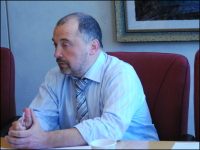Registration
You will receive an email confirming your registration.
IMGXYZ1269IMGZYXIn part because of the impact of the global economic crisis on Russia, regional elections held in the first four months of 2009 were more hotly contested than had been the case in recent years. The Carnegie Moscow Center’s Nikolai Petrov joined Martha Brill Olcott to discuss the meaning and consequences of these elections.
Analysis of Results
Although Petrov remained skeptical that these more deeply contested elections would lead to further democratization in Russia, he identified several important trends in the results of these elections.
- The United Russia candidate’s loss in Murmansk’s mayoral elections does not indicate that the party is losing sway. Rather, the competitiveness of this election forced United Russia to act more like a traditional political party by organizing meetings, forming local clubs, and holding open protests.
- Petrov was surprised that oppositionist Boris Nemtsov was allowed to appear on the Sochi mayoral ballot. The inclusion of his name, however, did not indicate an opening up of the electoral process; it was a useful tool for the Kremlin to show “a true United Russia triumph” and marginalize Nemtsov.
- While protests on a large scale in Russia are currently unlikely, Petrov argued that there is room for dissent on the local level. He warned that local political crises can lead to larger ones.
Challenges
Petrov remained most dubious about the Kremlin’s ability to address the grievances in Russia’s regions. Lack of communication between Moscow and the regions prevents the Kremlin from fully understanding the impact of the crisis. The main threat to Kremlin control is not opposition figures but ineffectual regional leaders whose mistakes could foment unrest.
